C21’s top 21 stories of 2016
A year of political shocks, celebrity deaths, an explosion in SVoD, format theft and executive musical chairs is summarised in C21’s annual round-up of the biggest stories we covered in the past 12 months.

The Grand Tour
Amazon sets off on Grand Tour
After Amazon madea number of high-profile additions to its talent stable in 2015, this year has all been leading up to the moment the online giant would catch up with its closest streaming rival Netflix and take Prime Video global.
Amazon left it late in the day, only recently confirming what C21 had reported it was plotting earlier in the year – but crucially undercutting Netflix’s price.
The Grand Tour was the streaming service’s most successful launch ever, according to the firm, while Transparent and Mozart in the Jungle remain cult and critical favourites. It has also been growing its footprint when it comes to original productions, ordering local series in Germany and Japan.
However, other considerable investments – such as Woody Allen’s Crisis in Six Scenes – have fallen flat. That makes all the work Amazon has been doing in 2016 to tie up exclusive non-US rights to forthcoming dramas like Starz’s American Gods and coproduction deals with the likes of Sky in the UK all the more important.

Tony Hall
BBC gets its charter
When discussions over the latest instalment of the BBC’s royal charter started two years ago, things looked dicey for the UK public broadcaster.
Rumours the UK government was looking to radically change the broadcaster by forcing through new scheduling regulations and restrict its programming – including smash hits such as Strictly Come Dancing – emerged along with further budget cuts.
Whether as a result of public outcry and industry-led disquiet, or because it was simply the plan all along, the BBC’s latest charter looks a lot more accommodating than was anticipated. It has also been extended to cover the next 11 years.
The culture secretary at the time, John Whittingdale, who has since been replaced by Karen Bradley, revealed plans in May to do away with the BBC Trust, while the pubcaster and its highest paid stars will have to face more financial scrutiny.
Action has been taken to close the loophole that had allowed people to watch the corporation’s iPlayer catch-up service without paying the licence fee. Meanwhile, the pubcaster has embraced suggestions it should launch new subscription services, and its commercial arm BBC Worldwide (BBCWW) has unveiled an OTT offering in the US with ITV.
BBC Studios received the go-ahead, while BBCWW has been allowed to retain its 50% stake in multi-channel operator UKTV.

Mark Linsey
BBC Studios readies itself
It was not a straightforward process but the best early Christmas present for BBC director general Tony Hall might have been BBC Studios finally getting the greenlight to operate as an independent entity.
Hall’s brainchild was unveiled in July 2014 and is now preparing to launch as a commercial, wholly owned subsidiary in April, to make programmes for other broadcasters and customers. In return, the BBC has had to offer up swathes of its programming that was previously produced in-house to all comers.
The venture was looking decidedly shaky when its head, Peter Salmon, left to join Endemol Shine Group in February, with Mark Linsey named as his successor a month later.
There followed a clear-out of senior management, with Lisa Opie replacing Natalie Humphreys to oversee factual, Nick Betts appointed in place of Mark Freeland for drama and Katie Taylor’s replacement Roger Leatham covering entertainment. More restructuring further down the food chain emerged in October, resulting in 300 or so job losses. The aim is to ensure BBC Studios is in market-ready shape for 2017.

Deirdre Brennan
Brennan leads ABC exodus
It has been a year of executive upheaval at Australian pubcaster ABC, which began in February when head of drama Carole Sklan and head of children’s Deirdre Brennan both stepped down.
Brennan subsequently resurfaced at Corus Entertainment in Canada and was replaced at ABC by kids’ TV veteran and one-time CBeebies controller Michael Carrington.
The upheaval preceded Richard Finlayson, the pubcaster’s head of TV, changing the whole management structure in March. Rebecca Heap took responsibility for all programming, including the broadcast channels, catch-up service iview and children’s digital, in the new role of head of audience and digital.
Brendan Dahill, who had been head of programming for the ABC’s linear channels for 27 months and before that was controller of ABC1, moved to the new position of head of non-scripted production. Sally Riley was promoted to oversee scripted in May.
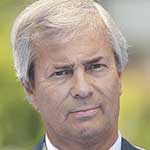
Vincent Bolloré
Canal+ woes continue
Since Vincent Bolloré, chairman of Canal+’s parent Vivendi, increased his control of the French pay TV broadcaster last year it has embarked on a seemingly relentless self-immolation mission which continued apace in 2016.
The controller of DTT channel D8, Xavier Gandon, joined the steady procession of departing executives when he left in March, followed by director of OTT services Manuel Alduy in May and deputy drama director Dominique Jubin in June.
Bolloré has replaced almost the entire senior management team inside 18 months. In April, Bolloré threatened to close the platform’s premium Canal+ channel, which he said could lose €450m (US$507m) this year, if a deal to share sports coverage with BeIN Sports was not approved. That deal was blocked by regulators in June.
The flagship channel has been losing viewers since the decision in June to cut back its free-to-air schedule and focus on pay – a move that has seen subscription numbers decline sharply and has now been largely abandoned.
The year ended with a strike at DTT news channel iTélé over a bid to more ‘infotainment’ programming and the decision to hire Jean-Marc Morandini as a host despite an ongoing legal case involving alleged corruption of minors and sexual harassment.
Vivendi, meanwhile, is embarking on a hostile takeover of Italy’s Mediaset.
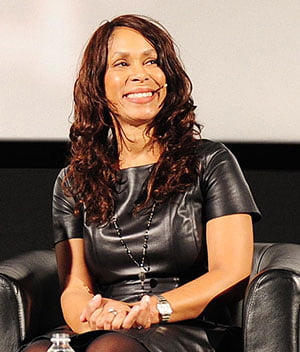
Channing Dungey
Channing Dungey gets top ABC job
Low ratings saw ABC Entertainment head Paul Lee fall on his sword in February after six years with the US channel, to be replaced by drama boss Channing Dungey.
The change followed the departure of Disney-ABC Television Group president Anne Sweeney, who was replaced by Ben Sherwood. Lee was thought to have been in the running for the role.
Dungey wasted little time in shaking up the network’s schedule and spoke at C21 Media’s Drama Summit in December about the need to programme for a new audience following Donald Trump’s election as president.

The Great British Bake Off
Channel 4 fires up Bake Off
It was the lead story on the UK evening news when Channel 4 took advantage of ongoing rows between the BBC and Love Productions to swoop on the rights to hit format The Great British Bake Off in September.
But despite Bake Off regularly bringing 10 million viewers to the BBC – which had previously lost The Voice to ITV in similar circumstances – doubts soon surfaced over whether C4’s £25m-per-season deal for the show was such a coup after all.
BBC Worldwide, the pubcaster’s commercial arm, held on to international rights to the format while it subsequently transpired that hosts Mel Giedroyc, Sue Perkins, Mary Berry and Paul Hollywood were not tied to the show.
Giedroyc, Perkins and Berry elected to stay with the BBC, leaving C4 to reflect on a £75m gamble that had bought them a name, a tent with some ovens in and Paul Hollywood.
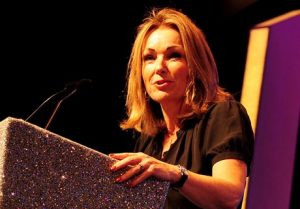
Jay Hunt collects C4’s Channel of the Year Award
C4’s lingering privatisation threat
Other than that it’s been a good year for C4, which was named C21 Media Channel of the Year at the Edinburgh International Television Festival in August.
But this was set against the background of a lingering privatisation threat that first emerged the previous November, which chief creative officer Jay Hunt described as “dispiriting and destabilising.”
The government seemed to back the idea in April, despite the channel’s CEO David Abraham repeatedly describing it as a potential disaster for the network.
Reports the government was backing down from the proposals emerged in May, but the new culture minister, Matthew Hancock, put it back on the table in July.
In addition, it has been suggested the broadcaster could move from London to Birmingham to further enhance its ‘nations and regions’ commissioning. However, Hunt has said producers “would rather have the money to spend than me sitting down the road for a cup of tea.”

Marjorie Kaplan
DNI’s year of upheaval.
Discovery Networks International lost some of its biggest names and longest servers in 2016. Marjorie Kaplan, a 20-year Discovery veteran who’d only moved to London to oversee the DNI business last year, left suddenly in August.
It’s a big role, leading the programming side at DNI, and was previously filled by industry heavyweights such as Kaplan, Phil Craig and Julian Bellamy. The company said it would now be focusing more on local production, and folded Kaplan’s team into the UK and Ireland operation under Susanna Dinnage, who has been named president and MD, rising from general manager of Discovery Networks UK and Ireland.
Intriguingly, there was no DNI stand at Mipcom this year.
What with Northern Europe boss Dee Forbes leaving to head Ireland’s RTÉ in April, commissioning editor Helen Hawken heading for production outfit Betty and now reports emerging that acting head of factual entertainment Mark Procter and VP of factual entertainment Sarah Thornton are both to depart as well, it’s certainly been a year of change.
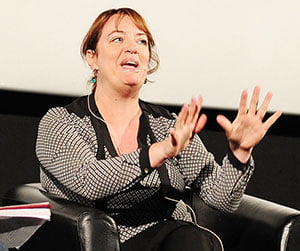
Polly Hill
Drama chiefs play musical chairs
The sands of UK drama commissioning continued to shift in 2016, headlined by Polly Hill’s surprise decision to jump ship from the BBC and join Kevin Lygo’s new team at ITV as head of drama.
Hill had beaten off competition from Faith Penhale to take the BBC’s head of drama role following Ben Stephenson’s departure the year before. But she was swiftly poached in April to replace Steve November.
Piers Wenger, who oversaw Indian Summers and Humans, among other shows, for commercial rival Channel 4, subsequently took up the head of drama commissioning role at the BBC.
The impact of Hill at ITV, Wenger at the BBC and Beth Willis at Channel 4, when she returns from maternity leave to lead the drama slate there, will be worth watching out for in 2017.

Nordisk Film TV Denmark’s All Against 1
Format theft action
C21 Media’s big pre-Mipcom scoop was the news that FremantleMedia’s Israeili prodco Abot Hameiri Productions was taking legal action against Banijay, claiming the French production giant’s All Against 1 format was a rip-off of its own The Best of All.
That battle is heading to court and has been followed by Sony Pictures Television (SPT) defending itself against an allegation that its NBC drama Timeless is actually a version of a Spanish drama.
But this is set against a wider backdrop of increased difficulties in format protection, according to Frapa.
It’s been an odd year for formats all round, with formats veteran Ana Langenberg leaving Endemol Shine in September and SPT axing its formats acquisitions arm in February.

Gurney show Duck Dynasty has been cancelled by A&E
ITV’s mixed year
January 2016 saw ITV’s director of television Peter Fincham stand down to be replaced by ITV Studios boss Kevin Lygo.
It proved a year of mixed fortunes for the UK commercial broadcaster, which had previously rapidly expanded through acquisition of production outfits in the UK and US.
ITV dropped its corporate broker JP Morgan and took on Citigroup following its failed attempt to buy production and distribution giant Entertainment One (eOne) for £1bn.
In November, the broadcaster predicted a further fall in advertising revenues as uncertainty around Brexit continued to make advertisers cautious. The company has already announced it was planning to shed 120 jobs due to economic uncertainty following the UK’s decision to leave the European Union. Among the job losses was the role of commissioning editor for entertainment held by Kate Maddigan.
The news came three months after ITV CEO Adam Crozier said the firm would have to save £25m following Brexit.
In December, ITV America announced it had dismissed the founders of its US prodco Gurney Productions, the firm behind recently cancelled Duck Dynasty, and is currently suing them for fraud.
The lawsuit alleges that the Gurneys secretly established a new company, Snake River Productions, in August that was competing with Gurney Productions, which ITV bought for US$40m in 2012. The Gurneys have denied all allegations against them.

Michael Lombardo
HBO’s Lombardo feels squeeze
Michael Lombardo, the HBO programming president behind hits including Game of Thrones, Girls and Boardwalk Empire, left the premium US cablenet after 33 years in May.
That followed the earlier departure of exec VP of drama development Michael Ellenberg. Casey Bloys, who’d already been promoted once earlier in the year, stepped into Lombardo’s role soon after.
An exec leaving after such a long time with one firm is always big news, but there is a wider context to this, with pressure from SVoD services, particularly Netflix, leading to declining cable subscriptions and so called ‘cord-cutting’ in the US increasingly pressuring previously dominant players like HBO.
The previously launched HBO Go streaming service will be a key weapon in its arsenal, but the news in August that the eighth season of all-conquering Game of Thrones will be the last won’t help.

DreamWorks Animations’ Shrek
NBCU buys DreamWorks Animation
NBCUniversal (NBCU)’s acquisition of DreamWorks Animation (DWA), valued at just under US$4bn, added another string to Comcast-owned NBCU’s bow.
The move has brought the company behind Shrek and owner of youth specialist AwesomenessTV into the same stable as US children’s channel Sprout, Minions producer Illumination Entertainment and Universal Animation Studios.
Inevitably, NBCU cut about 200 jobs at DWA following its takeover of the studio in August.
The television animation divisions of NBCU and DreamWorks have merged following the acquisition, which NBCU CEO Steve Burke said would help the company expand its film and TV businesses, as well as its theme park and consumer product divisions.
It has also sparked a number of high-profile departures from DWA, most recently its co-president Mireille Soria, while founder Jeffrey Katzenberg shifted over to become head of DreamWorks New Media.
The move was part of a growing trend for telecoms firms like Comcast to get into the content business, and was followed by AT&T acquiring Time Warner for US$86bn in October.
With Lionsgate acquiring premium cablenet Starz in June for US$4.4bn, the pace of big M&A activity shows no signs of abating.

Netflix drama The Crown
Netflix’s relentless march continues
Netflix began 2016 with possibly the largest and most impressive global roll-out a television company has ever embarked on, launching into another 130 territories.
A string of original commissions followed in several of its major territories, while in November it launched the highly anticipated UK period drama The Crown, to critical acclaim.
Linear broadcasters were affected too. C21 revealed that pubcasters across the Nordic region had lost out on the first-run rights to the forthcoming season of crime drama Sherlock after distributor BBC Worldwide agreed a deal with Netflix.
UK broadcaster Channel 4 lost the rights to air the third season of Charlie Brooker’s Black Mirror in the UK, six months after being outbid by Netflix in a US$40m deal. Meanwhile, Netflix acquired the worldwide streaming rights to ITV thriller Marcella and took the rights to stream US network CBS’s reboot of sci-fi series Star Trek.
All this came amid rumours that the Walt Disney Company was planning a takeover bid for the Californian firm.
In Australia, several smaller SVoD outfits have fallen by the wayside in the face of the competition. Last year, EzyFlix.tv folded, while in 2016 Quickflix was forced to re-launch with a new owner. Foxtel and Seven West Media also decided to dissolve their SVoD joint venture Presto.

Sky Atlantic’s big-budget drama Fortitude
Pivot closes
Participant Media’s decision to close its US channel Pivot in August was bigger news than simply a cablenet struggling for ratings during a tough time for cable.
It was also bigger than Sky losing its coproduction partner for Fortitude, and ABC in Australia likewise for Please Like Me.
In fact, this was indicative of a crisis facing the whole industry about attracting a younger audience to a linear channel in the age of OTT, SVoD, virtual reality, YouTube and all the rest of it.
Participant Media insisted it could when it launched the channel three years ago, but it turned out to be wrong. We now wait to see if Viceland (of which more later) can get it right.

Donald Trump
Political shocks aplenty
2016 will be remembered, among other things, as the year of the political shock.
The UK voted narrowly to leave the European Union – a move dubbed Brexit – in June against all expectations, and then Donald Trump defied the odds to win the US presidential election in November.
The results have forced execs to consider whether television operates in a media bubble, ignoring audiences north of London or away from the US coasts with their commissioning.
ABC’s Channing Dungey has already spoken of changing the channel’s strategy as a result, while the drama industry was told it was “out of touch” at C21’s recent Content London event.
There has also been significant financial fall-out, particularly after the Brexit vote, with ITV reporting advertising falls, job losses and budget cuts.

James Murdoch
Murdoch swoops on Sky, again
As 2016 nears its end, Rupert Murdoch has his sights set on acquiring the 61% of European satcaster Sky he doesn’t already down.
The timing almost certainly isn’t coincidental – Murdoch’s last bid in 2011 was scuppered by the phone-hacking scandal that hit his newspaper business and the UK government is now trying to decide whether to call in the latest approach while parliament is in recess for Christmas.
21st Century Fox’s US$14.8bn bid was accepted swiftly by Sky, with the ability to share production and rights’ buying capabilities fuelling the offer.
Rupert’s son James oversees 21st Century Fox and returned as chairman of Sky at the start of the year, indicating another bid was on the cards.
UK culture secretary Karen Bradley will now be busy over the Christmas period considering whether the deal raises public interest concerns around media plurality, which would require its referral to media regulator Ofcom.
Campaign groups such as Hacked Off, which helped derail the 2011 bid, have also launched petitions in an attempt to stop it going through.
With Sky’s shares currently trading at almost 8% below the formal Fox offer price, however, traders clearly don’t think the media mogul is home just yet.

Steve Mosko
Sony sends Mosko to Coventry
Steve Mosko left his job as chairman of Sony Pictures Television (SPT) after 20 years with the firm in June.
With successes like Breaking Bad and Better Call Saul seeing SPT contribute 60% of Sony Pictures Entertainment (SPE)’s revenue, the move came as a surprise, but always looked on the cards after the 2015 email hack on the company that revealed a strained relationship between Mosko and SPE CEO Michael Lynton.
The departure led to a restructure with Zack Van Amburg and Jamie Erlicht, presidents of programming and production, taking on his duties, reporting directly to Lynton.
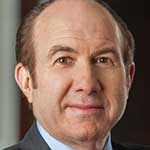
Philippe Dauman
Viacom leadership battle
One of the most bitter TV leadership battles in recent times has played out at MTV and Comedy Central owner Viacom the year.
It began in February when CEO Philippe Dauman stepped up to replace 92-year-old executive chairman and majority owner of Viacom Sumner Redstone amidst reports Redstone was suffering from ill-health.
The company’s shares immediately fell 21% and a power struggle ensued through the courts that eventually saw Dauman ousted in August.
Chief operating officer Thomas Dooley stepped up to replace him but then announced he would be quitting just a month later.
If anybody needs a settled 2017 it’s Viacom and its latest CEO Bob Bakish, but the departure of long-serving group president Doug Herzog this week compounded a turbulent year.

Shane Smith delivers his MacTaggart
Vice’s big weekend away
Vice Media CEO Shane Smith certainly wasn’t in a mood to waste his opportunity when giving this year’s MacTaggert Memorial Lecture at the Edinburgh International Television Festival.
Smith predicted an “M&A bloodbath” in the coming months involving Apple, Fox, Time Warner, Netflix and Viacom.
He also said television was responding to a period of rapid change by “retreating, with a lot of lawyers around us, to hold on to our IP and an increasingly small piece of the pie.”
ITV chief Kevin Lygo went so far as to use the word “odious” when asked for his reaction.
What does seem slightly counterintuitive is Vice’s big play for 2016: a linear channel targeting millennials.
Smith insisted in his MacTaggert that Vice’s content can bring that audience back to TV. The channel has been launched in more than 50 territories, including the UK and Ireland with Sky and Australia with SBS, plus others.
Whether or not he’s right – and the earlier mentioned demise of Pivot doesn’t bode well – will be one of the big stories of 2017.
































.jpg)




























